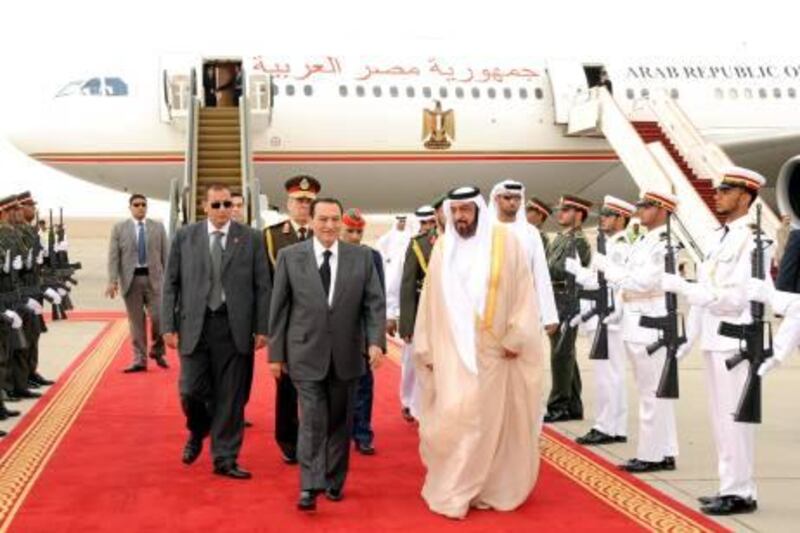ABU DHABI // Egypt rejects American demands for international monitors in its elections, and wants Iran to co-operate with the West on its nuclear programme, a top aide to the Egyptian president Hosni Mubarak said in the capital yesterday.
The security of the Gulf is crucial to Egypt's national security, said Suleiman Awwad, the presidential spokesman, citing the stand-off over Iran's nuclear programme and the dangers to the shipping industry in the Strait of Hormuz as key concerns.
Egypt also supports Palestinian demands for a freeze to West Bank settlement construction, including East Jerusalem, before the Palestinians return to direct negotiations with Israel.
Additionally, Egypt is seeking stronger trade relations with the UAE, as current levels do not represent the true potential of the relationship between the two countries, Mr Awwad said.
He is part of a high-level Egyptian delegation visiting the UAE that included Mr Mubarak, Ahmed Aboul Gheit, the foreign minister, Omar Suleiman, the head of Egypt's intelligence services, and Rachid Mohamed Rachid, the minister of trade and industry.
Mr Mubarak, who yesterday met with Sheikh Khalifa, President of the UAE and Ruler of Abu Dhabi, is on a Gulf tour that will take him today to Qatar and then to Bahrain.
Mr Awwad was speaking to reporters after Mr Mubarak arrived yesterday afternoon at Emirates Palace Hotel from Al Ain.
The security of the Gulf countries was important to the agenda of Mr Mubarak's tour, and their security is closely related to Egypt's national security, Mr Awwad said.
"There is an indivisible, organic linkage between the security of the Gulf and the national security of Egypt," he added.
When asked to elaborate on the Gulf's security situation, Mr Awwad, discussing Iran, said,"The security of the Gulf, the Hormuz Strait [and] its importance for the safe passage for international trade and energy supplies is very critical to us.
"We are monitoring very closely with them the development with regards to the confrontation and escalation between the Iranians and the international community," he said.
"Iran should prove beyond any shadow of doubt to everyone that it pursues only the peaceful uses of atomic energy."
While Iran has the right to use atomic energy for peace, it should not bring the region, the wider Middle East and the world to "a confrontation that would trigger serious, disastrous consequences.
"They have to co-operate with the West," said Mr Awwad. "Good faith is required by both parties."
Iran must demonstrate to its neighbours in the Gulf and the rest of the Middle East "that their nuclear programme is not pursuing the bomb", he said.
But Israel's nuclear arsenal must also be disarmed, he said.
"Nobody could accept the double standard to see the West attaching this importance to the Iranian nuclear file while turning a blind eye and a deaf ear to the Israeli nuclear arsenal," he said.
Egypt's parliamentary elections are scheduled for next week. The US State Department said last week that an open electoral process requires international monitors, which Egypt rejects.
Mr Mubarak gave Sheikh Khalifa a full briefing on the status of the peace talks between Palestinians and Israel, and the reasons behind the ongoing "deadlock".
"Settlement activity devours the occupied territories," he said. "To the extent that there will be no territory left for the Palestinians to establish their independent state."
The US is pressuring Israel to extend a settlement moratorium that expired in September, reportedly offering a military aid package that includes 20 F-35 Joint Strike Fighter aircraft to Israel for a 90-day extension to a freeze on settlement construction in the West Bank.
Mahmoud Abbas, the Palestinian Authority president, has insisted he would not return to direct negotiations unless the settlement freeze includes East Jerusalem.
Mr Awwad declined to state Egypt's position on the deal, since the package had not been formally presented to the Arabs or Palestinians.
kshaheen@thenational.ae







